How To Read Crochet Patterns for Beginners
When you are first starting to crochet, learning to read crochet patterns can seem overwhelming and easier to skip over and instead opt for video patterns. While following along with a crochet video tutorial is helpful, sometimes, it isn’t always possible if the pattern doesn’t have a video to go along with it.
In cases like this, you’ll want to be able to understand what everything means in a written crochet pattern, which is why this guide will be helpful! If you’d like a simple step-by-step explanation of how to follow a crochet pattern, then you’ve come to the right place.
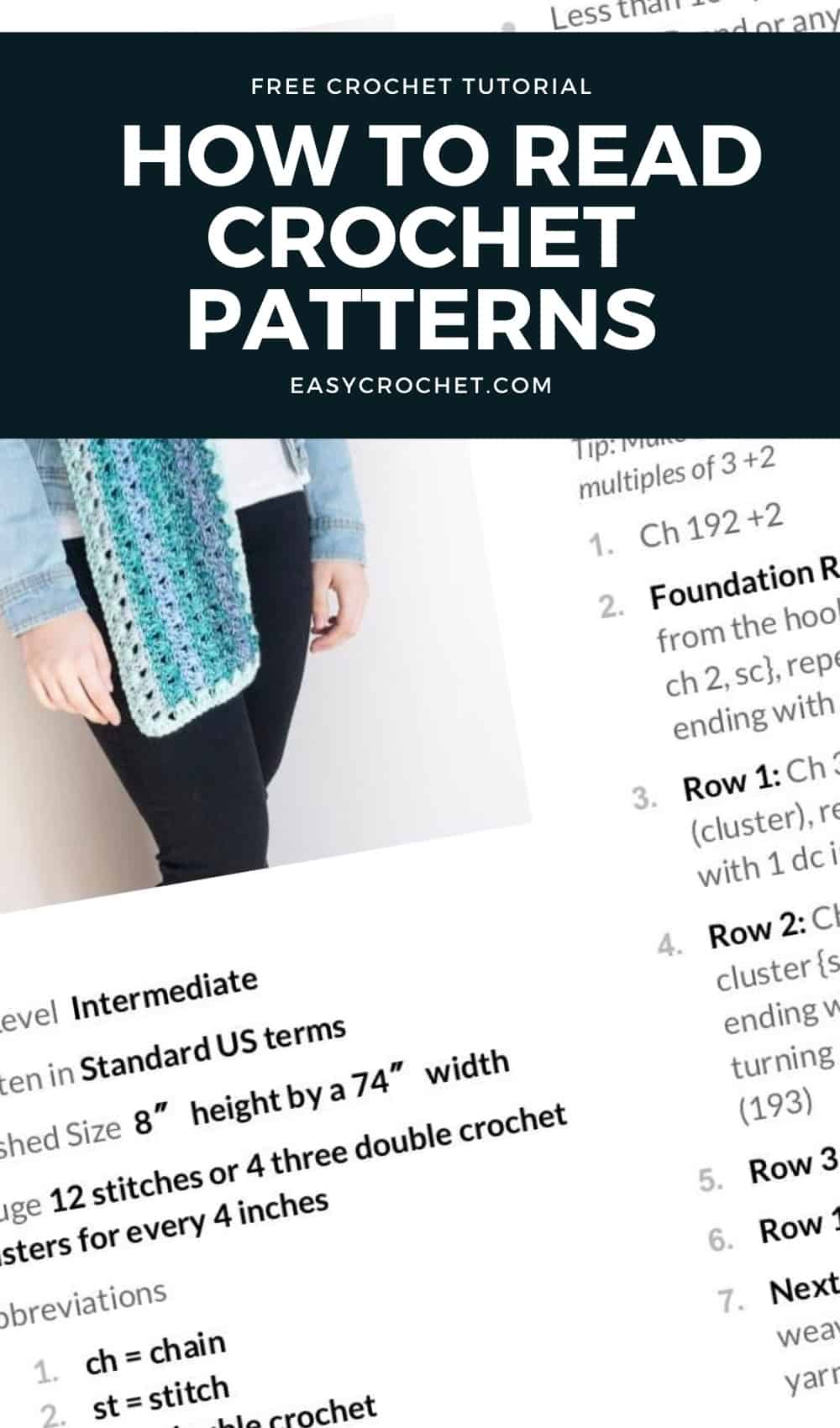
How to Read A Crochet Pattern
Scroll on down to learn how to follow a crochet pattern with our guide that will lead you through each section slowly, so you will be sure to succeed in reading a pattern.
Different Crochet Pattern Sections
As a beginner crocheter, it is a good idea to start with an easy pattern for your first crochet project. Follow along with this beginner scarf pattern as an example and familiarize yourself with how they are written.
I suggest opening up the pattern in a new tab and using it as a reference when I explain all the parts of the pattern. Below you’ll find each part and section of the scarf pattern explained in detail, which will help you follow a crochet pattern easily!
1. The Skill Level
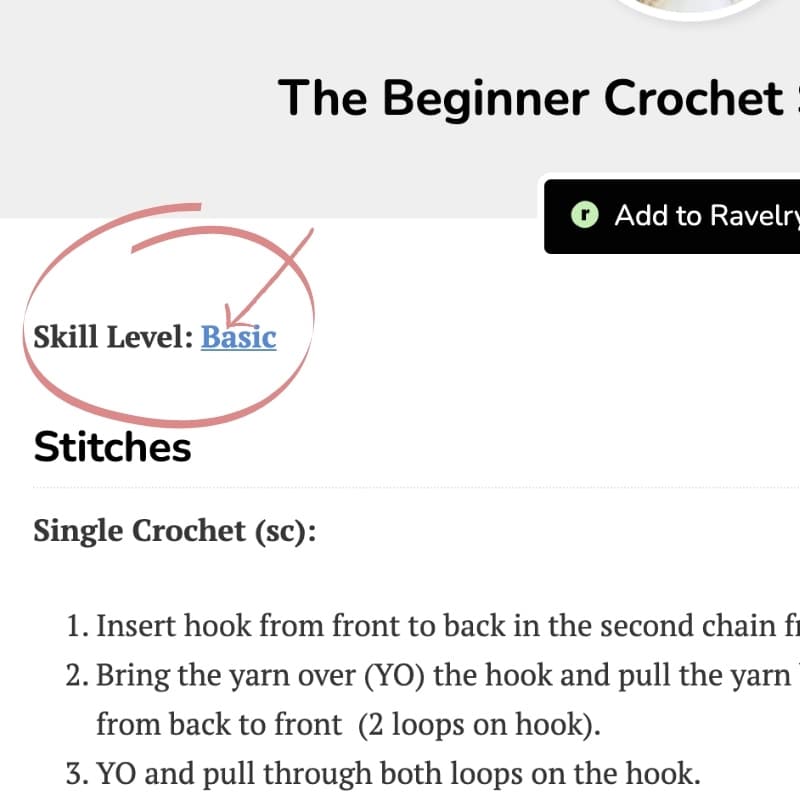
This is the part of the crochet pattern that will tell you what skill level you should be at to successfully be able to complete the pattern. You can see in the image where I have circled the skill level of the scarf pattern.
Skill levels of crochet patterns are broken down into four different levels.
- Basic
- Beginner or Basic projects are for first-time crocheters and use basic crochet stitches, simple stitch repeats and minimal shaping.
- Easy
- Easy projects use basic crochet stitches with simple variations. These projects may include simple color changing, shaping and finishing work.
- Intermediate
- Intermediate projects will include a variety of different crochet stitches and techniques, as well as mid-level shaping and finishing work.
- Complex
- Experienced, or Complex crochet projects will have intricate and complex variations and techniques with non-repeating patterns, multiple color changes and refined shaping and finish work.
2. The Stitches and Abbreviations
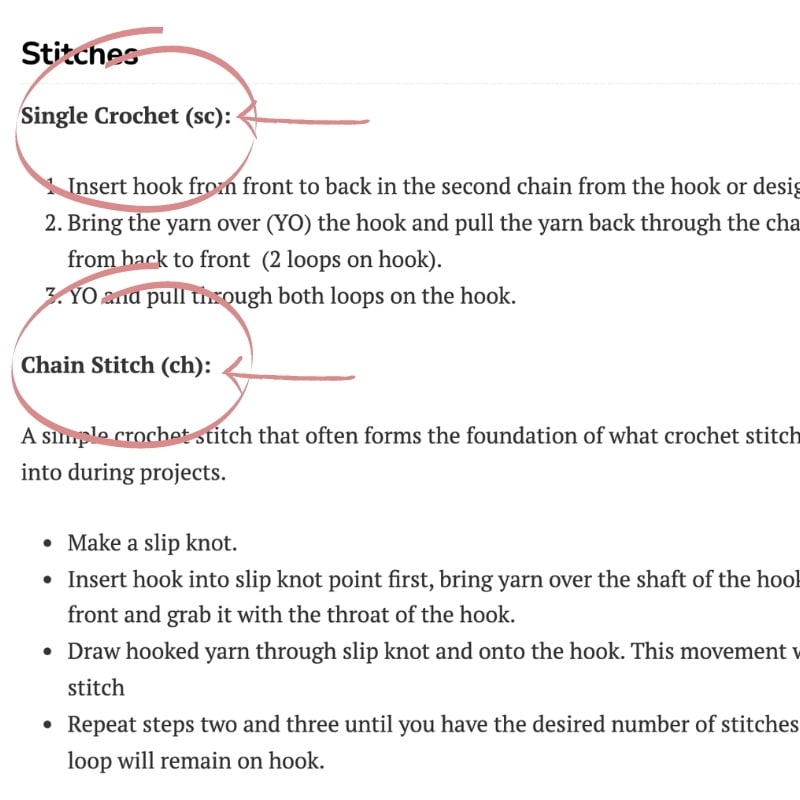
This is the part of the crochet pattern that will explain the stitches that are used, as well as the abbreviations of the stitches.
You can see the two stitches that circled in the image that you will need to know before beginning this beginner scarf.
You will find that some patterns will not list the crochet stitches and abbreviations, so if that is not the case, look over the pattern to find the stitches used to see if you’ll be able to complete them.
The example scarf pattern shows that you will need to know how to single crochet (sc) and how to chain (ch). This is a basic beginner level stitch and one of the reasons this pattern is categorized as a basic skill level pattern.
3. Crochet Symbol Chart
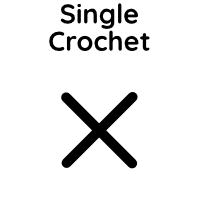
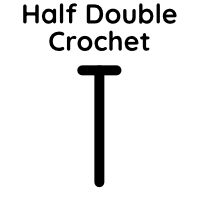
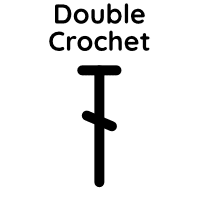
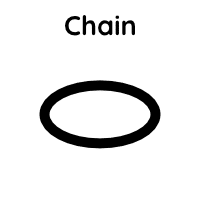
Some crochet patterns come with a chart that is full of symbols arranged in such a way that basically show you the whole pattern. If you know how to read the symbols inside these charts, it will make your project go much faster than trying to follow along to the written directions.
4. Finished Size and Gauge
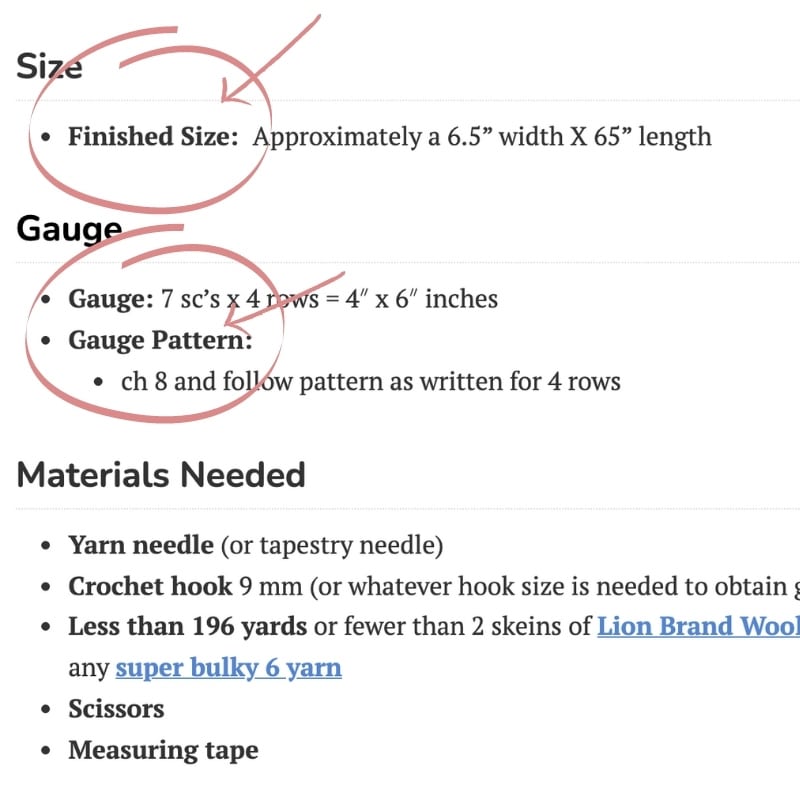
This section of the pattern will tell you the size and or different sizes of the finished item, such as dimensions if you are making a garment. To make sure the size of your finished project is the same as listed, you’ll need to make a gauge swatch.* You can see both the size and gauge swatch are shown in the image.
A gauge swatch is a way to check your stitch size before beginning a crochet pattern by crocheting up a small sample of a pattern. Not everyone crochets with the same, and this will tell you if you crochet loose or tight stitches. If the gauge swatch is different from the pattern’s recommended gauge, you will then need to adjust your crochet hook size until the gauge is met. This may mean you need a smaller hook or larger hook, depending on your gauge.
To get the measurement of your gauge swatch, use a tape measure. I recommend a soft tape measure that can be found in the sewing department of most craft stores or online.
*not every pattern will include gauge, and/or the gauge may not be important to that particular pattern’s design.
5. Materials
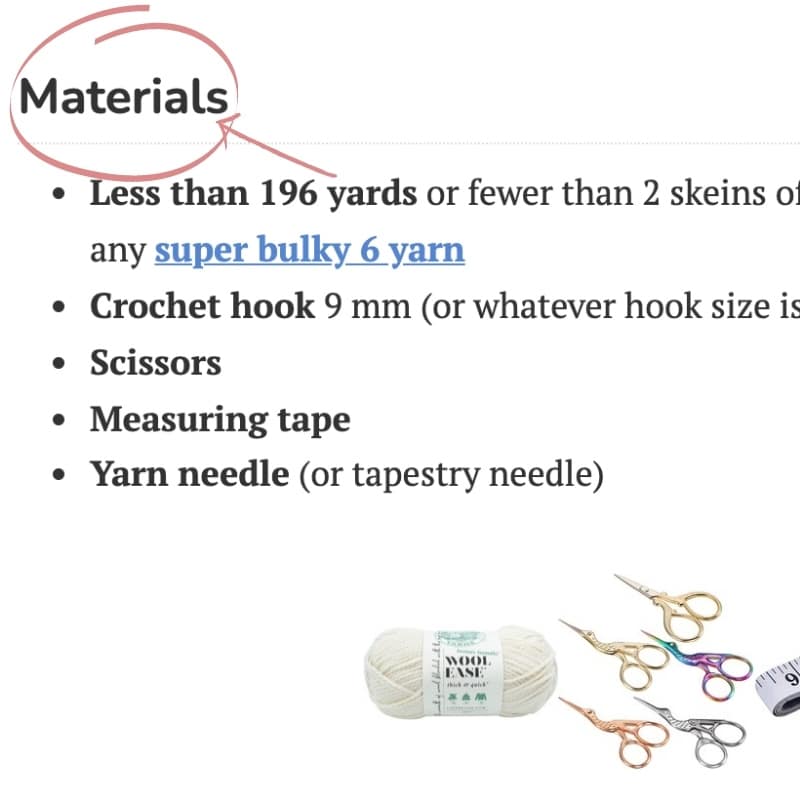
This part of the crochet pattern will list the materials like the yarn, crochet hook size and extra items needed to complete the pattern.
Yarn: Yarn comes in many weights (how thick it is) and yardages. You will want to try to use the yarn recommended, but if you are unable to, the pattern should list the total yardage of yarn used, so you can purchase a substitute yarn. You will want to also make sure you are using the correct yarn weight, so the pattern works out correctly.
Crochet Hook: A crochet hook is a tool used to form crochet stitches. The crochet hook size needed for the pattern will be listed under this materials section.
Other Tools & Supplies: This could be tools like a yarn needle (used to weave in yarn ends), scissors, stitch markers (used to mark stitches) and measuring tape.
6. Notes
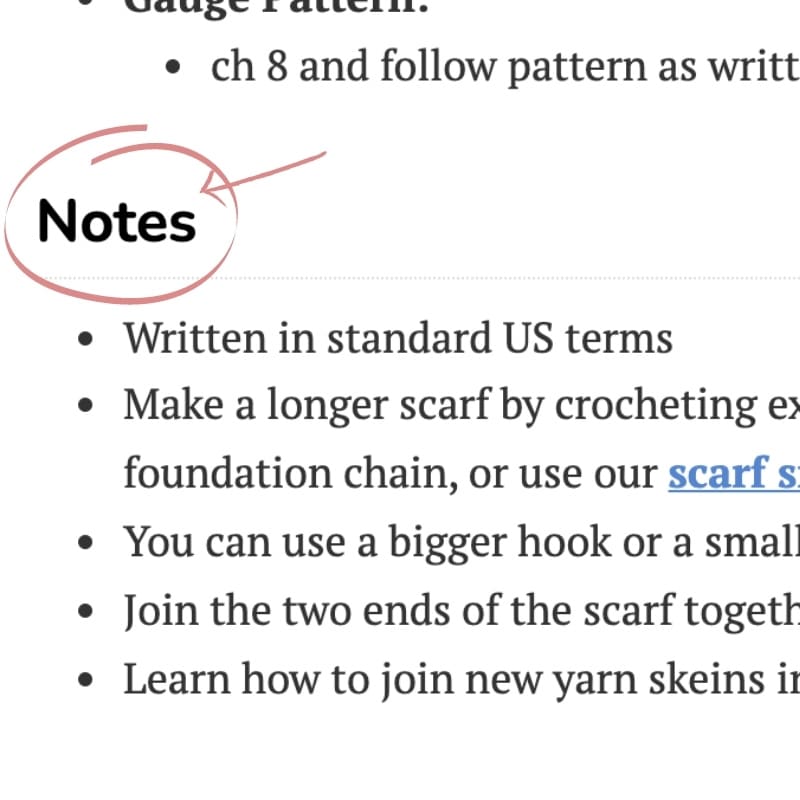
This section of a crochet pattern will explain any special notes you will need to know about the pattern you are crocheting.
These may be things like the terms the pattern is written in, how to change the size, different crochet techniques used and anything the designer thinks you should know before starting.
What’s included:
Pattern Terms: The most common terms are US terms or UK terms. You can use our guide to learn the difference between US + UK terms. All the Easy Crochet patterns here on easycrochet.com are written in US terms, which will always be listed in the notes section.
Extra Notes: This can include how to change the size, how to join, making buttonholes, blocking, seams and more in a crochet pattern.
7. The Main Crochet Pattern
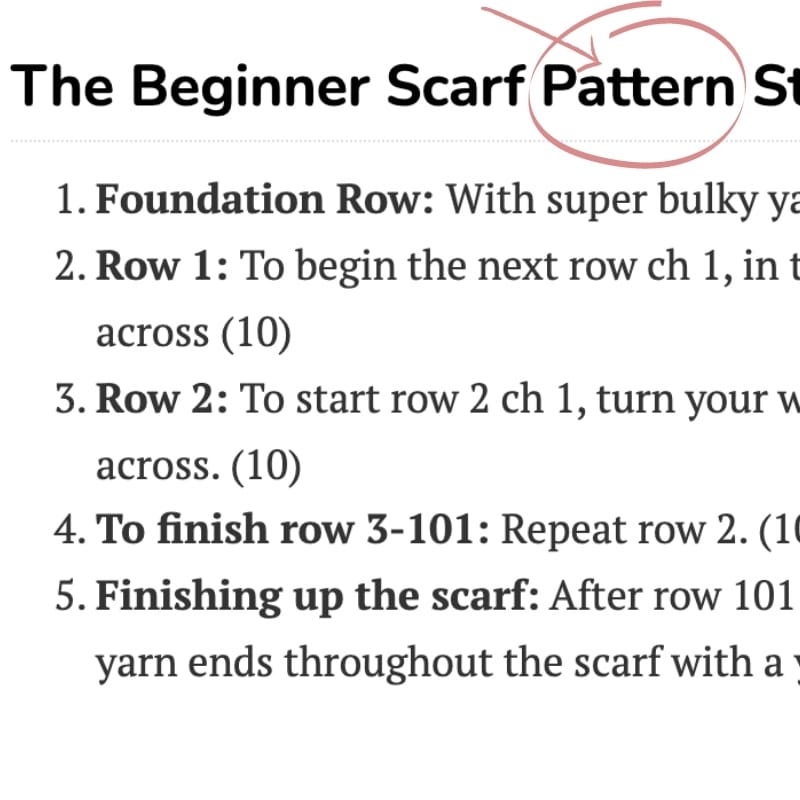
This is where you will find the primary instructions on how to work a crochet pattern. This crochet pattern starts with a foundation chain(ch) and then is followed by directions on how to work the next stitch and the rest of the first row of the pattern.
Next, you will take note if the pattern would like you to turn your work. Turning your work simply means flipping over the work to begin the next row of stitches.
Every time you turn your work to crochet across the previous row, a different side of the piece will be facing you. *If the first row is selected as the right or front side of the pattern, then when you turn to work, the next row would be considered the wrong and or back side.
* if this is important in the pattern you are creating, most designers will let you know in the note section of the pattern.
In the pattern shown in the image, you will see the stitches being written out with abbreviations, which you will be able to find in the crochet stitches and or abbreviations section in the pattern.
Also, at the end of the row you will sometimes find parenthesis, which will be used to let you know how many stitches will be in that row.
Finally, at the end of the pattern you will see directions on how to finish your pattern, which may include weaving in ends and or other techniques.
Common Crochet Stitch Abbreviations and Shorthand in Patterns
Below you will find basic crochet stitches and their abbreviations, as well as shorthand and crochet actions that will give a more in-depth understanding of patterns. As a crocheter, will come across these occasionally when reading a crochet pattern.
| Abbreviation | Term |
|---|---|
| ch | chain |
| st(s) | stitch(es) |
| sl st or ss | slip stitch |
| sc | single crochet |
| dc | double crochet |
| hdc | half double crochet |
| tr | treble crochet or triple crochet |
| dtr | double treble crochet |
| trtr | triple treble crochet |
| qtr | quadruple treble crochet |
Common Shorthand
| Shorthand | Repeating Description |
|---|---|
| * | Repeat instructions after asterisk or between asterisks as many times as instructed. |
| ** | Repeat the instructions between the double asterisks as many times as directed or repeat at specified locations |
| { } | Work the instructions within curly braces as many times as directed |
| [ ] | Work the instructions within square brackets as many times as directed, or is used to show a repeat inside a repeat. |
| ( ) | Work the instructions within the parentheses as many times as directed. This can also mean that you need to work a group of stitches all in the same stitch or space. |
Abbreviations for Crochet Actions
To show actions that need to be performed inside a crochet pattern, the crochet abbreviations below are used as shorthand in some patterns. Note: Not all crochet patterns will use shorthand versions of actions.
| Abbreviation | Crochet Action |
|---|---|
| alt | alternate |
| beg | begin(ning) |
| bet | between |
| con or cont | continue |
| dec | decrease |
| foll | follow(s)(ing) |
| inc | increase |
| lp | loop |
| patt | pattern(s) |
| rem | remain(s)(ing) |
| rep | repeat(s)(ing) |
| RS | right side |
| sk | skip |
| sp | space(s) |
| TBL | through back loop, or turning back loop |
| TFL | through front loop, or turning front loop |
| tog | together |
| WS | wrong side |
| yo | yarn over |
Crochet Beginner Guides
These beginner guides will get you familiar with other techniques, which will help you with following crochet patterns of all types.
- Double the Fun: A Guide to Holding Two Yarn Skeins Together
- The Easy Way to Add and Use Crochet Appliqués
- Crochet the Perfect Temperature Blanket Guide (+ Free Patterns)
- Understanding The Right Side vs Wrong Side in Crochet
- Why is My Crochet Blanket Curving And How to Fix It!
- The Many Types of Crochet
- The 9 Best Ways to Seam Crochet Projects Together
- What is DK Weight Yarn?
- How Much Yarn Do I Need For a Crochet Project?
Easy Crochet Patterns for Beginners to Try
Now that you know how to read and follow along with a crochet pattern, here are some beginners level designs that you may enjoy crocheting. Just remember to follow along with the tutorial above about how to read each section of a crochet pattern, and you will be good to go!
Share this on Pinterest to Crochet Later
Use the images below to pin to Pinterest, so you can make learn how to read a crochet pattern when you are ready. Follow along with on there too since we always share new free patterns as well as crochet stitches and tutorials too.


